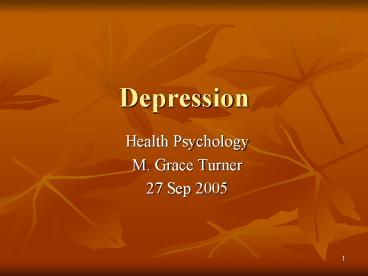Depression - PowerPoint PPT Presentation
1 / 10
Title:
Depression
Description:
DSM-IV defines MDD as a period of at least two weeks where a ... For some people, episodes are recurrent, lasting once/mo, yr, or ... Lexapro, Zoloft, ... – PowerPoint PPT presentation
Number of Views:111
Avg rating:3.0/5.0
Title: Depression
1
Depression
- Health Psychology
- M. Grace Turner
- 27 Sep 2005
2
What is Depression?(Physiology)
- It is NOT bipolar.
- Brain Functions (Video)
- Many forms of depression exist.
- Two major types of depression
- _________________________
- -DSM-IV defines MDD as a period of at least two
weeks where a person experiences five or more
symptoms, during which there is either a
depressed mood or the loss of interest or
pleasure in nearly all activities. - - For some people, episodes are recurrent,
lasting once/mo, yr, or several times throughout
their lives.
3
What is Depression(Physiology)
- _______________
- -DSM-IV defines this illness as a state of
overwhelming, yet chronic depression, exhibited
by a depressed mood for most days experiencing
two or more symptoms lasting at least two years. - -Chronic form of depression.
- Depression often coexists with other mental and
physical illnesses, such as ______________,
eating disorders, and anxiety disorders.
4
Who is at risk?(Occurrence)
- Anyone is at risk for depression.
- May occur at any age, but frequently develops
between the ages of __________. - Although the majority of people experience at
least one depressive episode during their life,
it is not a ________ part of aging. - During a single life time, as many as 25 of
women, and 12 of men may suffer from ______.
5
Signs of DepressionWarning signs
- Prolonged ________
- Unexplained crying spells
- Significant changes in sleep patterns or appetite
- Irritability, anger, worry, agitation, or anxiety
- Loss of energy, persistent lethargy
- Social withdrawal
- Inability to take pleasure in former interests
- Inability or difficulty concentrating
- Recurring thoughts or talk of ____________
- Feelings of guilt, hopeless-ness, or
worthlessness
6
Is there Help?(Treatment)
- Medications
- ______________________ (grouped based on what
chemical in the brain they affect) - Selective serotonin reuptake inhibitors (SSRIs)
- -Lexapro, Zoloft, Prozac, Paxil
- Serotonin and norepinephrine and dopamine
reuptake inhibitors (SNRIs) -Effexor, Cymbalta - Norepinephrine and dopamine reuptake inhibitors
(NDRIs) -Wellbutrin - _______________ -Elavil, Aventyl, Pamelor
7
Is there Help?(Treatment)
- Medications cont
- Monoamine oxidase inhibitors (MAOIs) -Nardil,
Marplan Least used medication b/c of its serious
side effects. - Talk Therapy
- _________________ or talk therapy can sometimes
work alone in cases of mild to moderate
depression, but may also be used in conjunction
with other forms of treatment. - There are several types of psychotherapy
including interpersonal, marriage family,
cognitive behavioral, and group.
8
Is there Help?(Treatment)
- Herbal or Natural Remedies
- Dietary supplements include Omega-3, St. Johns
wort, and SAM-e. - Recent studies have shown that herbal tx, such as
St. Johns wort, may interfere with beneficial
effects of some medications. - ________________________________
- Used extreme or rare conditions ONLY.
- A painless procedure where mild electrical
stimulation is sent to the brain, causing brief
seizures, which in turn, relieve the depression. - An average of ______________ sessions over a
three to four week period is required to complete
tx.
9
How can I Help?(Support)
- Support and encouragement from family and friends
makes a difference. - If you or someone you know is depressed call
- AU Student Counseling Services
- (334) 844-5123, 2086 AUMC
- M-F 8a-5p
- AU Psychological Services Center
- (334) 844-4889, 1119 HC
- M-Th 745a-7p, F 745a-445p
10
How can I Help?(Support)
- Crisis Center of EAMC
- (334) 821-8600, Opelika, Al
- Su-Th 8a-12a, F Sa 24hrs
- Crisis or Suicide Hotline
- (205) 323-7777 Birmingham Hot line
- (800) 784-2433 Natl Hope line Network
- (800) 273-TALK (8255) Natl Suicide Hotline

